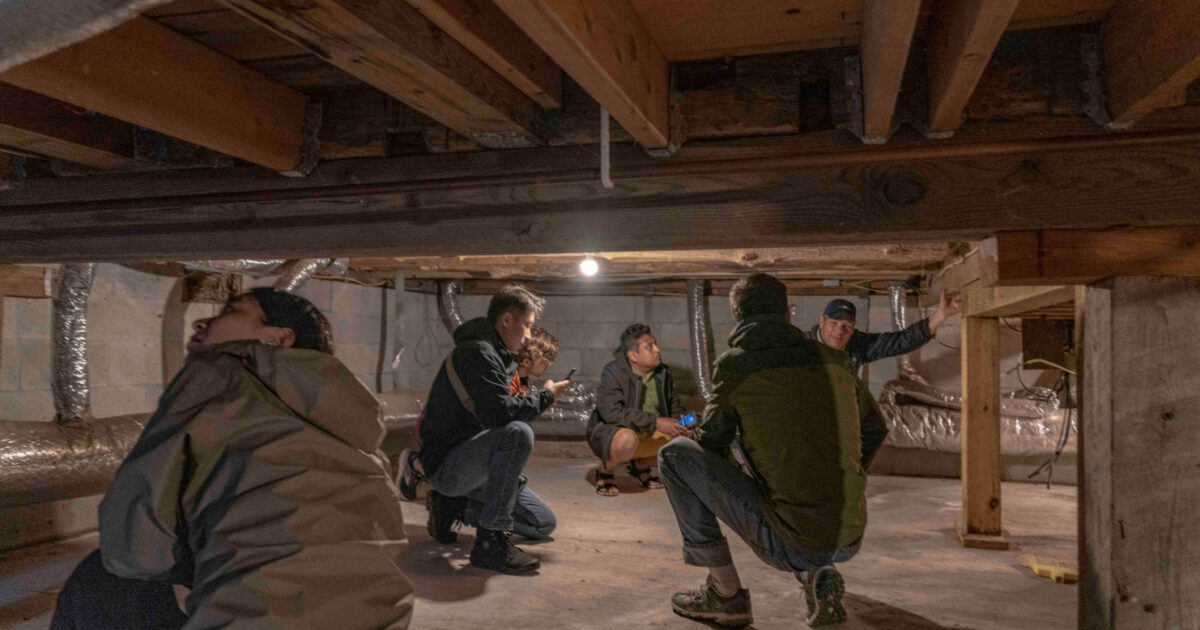The Nantucket Historical Association (NHA) will host a group of working professionals from around the world for a four-week program dubbed “Climate Action for Sustainable Built Heritage Conservation and Management,” which will focus on the restoration project of the Whaling Museum’s Candle Factory North Wall that began this month. The program seeks to add important components to much of the flood mitigation and resiliency efforts underway on Nantucket.
“We are thrilled to launch this program and continue this critical work that has been two years in the making since we hosted our first symposium on climate change conservation and protection with the National Park Service back in 2022; and had our first eight-week program to evaluate the conditions of each of the NHA’s properties with students and working professionals in the summer of 2023,” said Niles Parker, NHA Gosnell Executive Director. “We are prioritizing our relationship with our expert partners from ICCROM and ICR and using this opportunity to bring these professionals into the fold, as we have real-time restorations underway that were identified as priority projects to safeguard the island’s historic buildings from climate and disaster risks.”
From nearly 200 applicants for this training course, 11 working professionals were chosen from various countries around the globe, including Japan, Iraq, Albania, Spain, Kenya, Portugal, Australia, Saudi Arabia, Jamaica, and India. The course will begin today, October 28 and run through November 22, with the main objectives including assessing climate risks to built heritage, developing appropriate monitoring and adaptation strategies, and building an international network of skilled professionals. The course will include lectures, hands-on workshops, and site visits to the NHA’s restoration projects. The course will conclude with presentations by each working professional that the NHA, ICCROM, and ICR look forward to sharing with the public.
“One idea that we all agreed on at the symposium in 2022 is that there is a great deal of data that has been generated on climate change at an overarching level, but there is no real site-specific data that helps us understand threats and therefore design conservation and stabilization solutions to address those threats on the ground,” said Glenn Boornazian of Integrated Conservation Resources, Inc. (ICR). “We all agreed that taking this next step was essential and this new program and the one we partnered on in 2023 are great steps forward in generating this data for cultural heritage sites worldwide.”
In January 2024, the NHA signed a three-year Memorandum of Understanding with the International Centre for the Study of the Preservation and Restoration of Cultural Property (ICCROM) to formalize their commitment and partnership to drive collaborative research, training, and field projects aimed at influencing global policies and methodologies for climate action in built heritage conservation. This joint effort and work are the first of its kind and the NHA called it “vital in protecting Nantucket’s historic sites and gathering information that can be shared globally through ICCROM’s networks and resources.”
“ICCROM is looking very much forward to collaborate with the Nantucket Historical Association and Integrated Conservation Resources, Inc. for this pioneering training course that will help in building capacities of professionals from around the world to protect and manage built heritage from the increasing impact of climate change.” said Rohit Jigyasu, Ph.D., Programme Manager: Sustainable Urban and Built Heritage Conservation, Disaster and Climate Risk Management & Post Crisis Recovery Programmes Unit, ICCROM.
ICCROM is an intergovernmental organization based in Rome that promotes the conservation of all forms of cultural heritage in every region of the world. It is a UNESCO-funded organization created after World War II to bring scientists, architects, universities, and more together to develop programs for restoring and conserving cities and cultural sites destroyed and damaged by war. The only institution of its kind in the world, ICCROM, is small and agile, with a vast network of conservation experts that relies on formal institutional collaborations.
